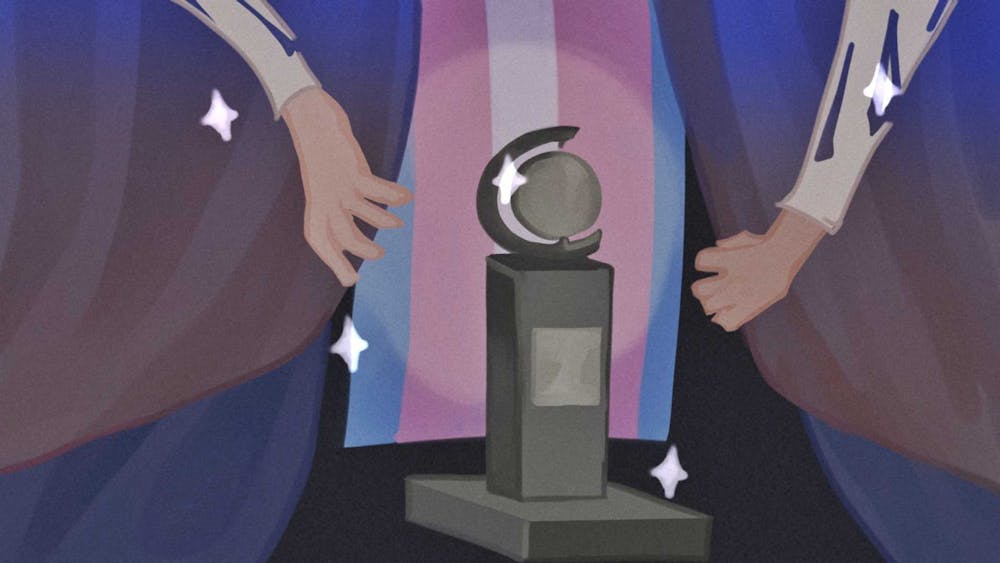The 76th Tony Awards, which took place on Sunday, June 11, went a bit non–traditional this year. Beyond simply taking place for the first time in the United Palace in Washington Heights, the awards ceremony was aired entirely unscripted. Despite the lack of script, the show went smoothly, with historic wins for transgender performers and awards that confirmed that audiences are thirsty for original material.
The host, Ariana DeBose (who you might know from many a Broadway show, the musical–comedy TV show Schmigadoon!, or her iconic BAFTAs rap), opened the night by flipping through a blank script, a nod to the ongoing Writers Guild of America strike and an acknowledgment that the rest of the night would be done off the cuff. Instead of an opening monologue/parody musical mash–up—the traditional way Tonys in years past have started—DeBose performed a dance number with no dialogue. She then introduced herself and kicked off the ceremony, telling the audience to “buckle up” for a scriptless show, especially “anyone who may have thought last year was a bit unhinged.”
The Tonys’ scriptless–ness this year is due to the fact that members of the East Coast faction of the WGA, which is currently on strike for the first time since 2007, are responsible for writing the award show's script. After a long bout of negotiations with the WGA, the Tonys were allowed to air normally, sans script, without Guild picketing. The WGA agreed that their strike should not do damage to their siblings in theater, particularly considering the somewhat precarious place live theater is at in this post–COVID–19 moment.
Broadway seems to be coming back, though, and the moment from the Tonys that seems to most firmly support that was Kimberly Akimbo's win for Best Musical. Kimberly Akimbo is an original show—something that seems to be pretty hard to come by in the current musical theater landscape of revivals, adaptations, and jukebox musicals. The win for this charmingly weird and off–kilter production, although less of a box–office success and tourist–pull compared to its peers, was a win for good, interesting theater.
Aside from the actual handing out of awards, without speeches and scripted introductions, performances took even more of a central role in this year’s ceremony than usual. Some were even from shows that were up for awards last year: Lea Michele sang “Don’t Rain On My Parade” from the eligible Funny Girl, a performance that even after countless renditions of it on Glee, never fails to be a showstopper.
But this year's Tonys' most standout moments came from the very fact that performances had a chance to go off script. In today's tense political climate, many winners took their moment in the spotlight as an opportunity to speak about current going–ons in the world around them.
Some took the opportunity to show their solidarity with the WGA strike, such as Best Featured Actress in a Play winner Miriam Silverman. Others used their time to talk about the culture of hate being perpetuated in current politics. In a country where the number of pieces of anti–LGBTQ legislation grows by the day and where antisemitism is on the rise, Best Musical Director winner Michael Arden talked about the themes of antisemitism and bigotry in Parade, as well as delightfully declaring, “Growing up, I was called the f–word more times than I can remember. And all I can say now is: I’m a faggot with a Tony!”
Nowadays, the trans community is especially being targeted by government legislation. Various state governments (as well as the federal government) are embroiled in battles pertaining to the banning of gender performance through drag, the rights of trans athletes, and the right of trans kids to be able to receive gender-affirming healthcare. A particularly violent battleground is Florida, with its Gov. Ron DeSantis pushing a slew of aggressive anti–LGBTQ legislature.
Perhaps the most iconic moment of the night was actress Denée Benton’s introduction of the yearly award given to theater educators, during which she stated her dislike for DeSantis’s policies. The award this year went to Joseph Zembuch–Young, a teacher in the unfortunately–named Plantation, Fla., who incorporates ASL into his theater education and encourages his students to learn the language. Benton, while setting up the award, took a dig at DeSantis, calling him the “current Grand Wizard—excuse me, governor” of her home state.
And on the Tonys stage, trans people kept on winning. Alex Newall and J. Harrison Ghee became the first nonbinary performers to win Tonys (and the second and third nonbinary people to win, as Tony Marlow became the first nonbinary Tony winner last year for the Best Original Score award for Six).
Newall, the newest addition to the roster of Glee alumni with Tony awards, gave a passionate acceptance speech. “Thank you for seeing me," they said. "Broadway, I should not be up here as a queer, nonbinary, fat, Black little baby from Massachusetts. And to anyone that thinks that they can’t do it, I’m going to look you dead in your face and tell you that you can do anything you put your mind to.”
These wins from nonbinary performers come after nonbinary & Juliet performer Justin David Sullivan abstained from being nominated in either actor or actress category earlier this year, not wanting to be confined by either label.
The wins at the Tony’s this year illustrate the the need for new, original, and creative theater—not only to liven up the atmosphere, but also because, put simply, new, original, and creative theater is damn good. Its win, along with the groundbreaking wins for trans performers, provides hope that a strong, creative, and progressive new era of Broadway is here.

